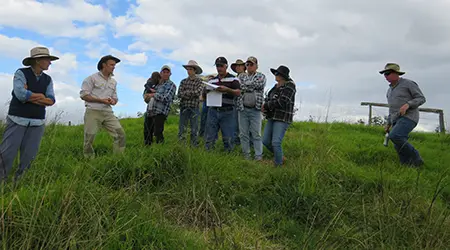
Annual field walk looks at group GRT control
More than 18 landholders attended the Upper Broken River catchment’s Giant rat’s tail grass (GRT) field walk on 3 June.
Landholder feedback on their GRT grass control efforts was a key focus, along with demonstrations of the gear used for GRT control, and an inspection of trial paddocks to see results.
The group also visited Rocky Falls where landholder Mick Sheehy showed off the group’s shared lime dropper.
LDC’s Land Management Support Coordinator Rodger Walker said the day was another activity in the project’s support of the Eungella-Crediton cluster.
“The day was another key stepping stone for producers to be able to understand their pastures, soils, weeds and local grazing land management decisions,” he said.
The event built on the outcomes and success of previous LDC GRT events in Crediton (July 2019 and September 2020).
“The focus continues to be on managing pastures and weeds more through pasture management and soil health and less through herbicide application,” Mr Walker said.
“The event also served as a great way for host landholders to present back to their peers directly of their involvement in two Exploring New Incentive (ENI) projects.”
The group met at the Crediton Hall where landholder Paul Tippett provided a demonstration and explanation of the Redback Weed Wiper that a group of four landholders has been trialling to control GRT.
The weed wiper was purchased through an LDC ENI grant in 2020. Landholders trialling the wiper agreed having the ability to selectively wipe just the weeds means they potentially can save on chemical costs, and time, while improving pasture.
Weed wipers are not common in the catchment and the demonstration provided an opportunity for landholders to also assess their value for wider pasture management.
The group also heard from technical specialist John Reeve (Department of Agriculture and Fisheries) who has assisted landholders during the last three years.
Mr Reeve said keeping paddocks appropriately stocked, having good soil health, and managing grass growth using grazing was key to managing Giant rat’s tail grass.
“Stock is pivotal in controlling GRT. The correct grazing regime for the property, along with chemical control, can contain the grass population,” he said.
“Whatever the proposed yearly cattle income is, if you allow one third of that to be used for fertiliser options in a GRT environment, you reduce the GRT to improve your income.
“This means every year you lift your income and are decreasing the impact of your GRT.”
For a trip down memory lane, these two stories report on the first and second GRT workshops. The LDC project would like to acknowledge Department of Agriculture and Fisheries (DAF) has provided technical assistance to landholders throughout the GRT management trials.
Members of the Eungella-Crediton cluster group at Mick Sheehy’s property “Rocky Falls”.
Landholders discuss the effectiveness of their approach to controlling GRT during the field walk.
Eungella-Crediton cluster group members inspect their new lime dropper.
Paul Tippett explains the workings of the Weed Wiper.
Tennents’ innovative idea for weed control proved to be a winner
The LDC project developed a New Incentives framework to help grazing enterprises to build resilience into their business while improving water quality outcomes, production, and the knowledge and skills of people working in the enterprise.
The grants were aimed at encouraging grazier with innovative ideas they wanted to trial aimed at tackling property issues such as weeds, animal health and welfare, herd productivity, and erosion.
Eungella graziers, Kel and Mandy Tennent, of Cloudbreak, were successful in securing a New Incentives grant to implement a plan to manage GRT grass and other weeds. Kel and Mandy undertook weeds and chemical control training as part of the grant criteria.
Initial outcome has been a reduction in herbicide use and overspray, and improved land and water condition on the property. The Tennents also introduced a grazing plan to manage pasture.
“We are really happy with the weed wiper. The immediate bonus has been that we can still use it on windy days, and there’s been a huge decrease in the amount of chemical usage, therefore reducing costs,” Kel Tennent, Cloudbreak.
The LDC project’s Exploring New Incentives looks at ways to address financial and other barriers to the adoption of improved grazing land management practices and landscape remediation approaches in the BBB catchment.
Paul Tippett is flanked by Kell and Mandy Tennent during a 2019 field day.






